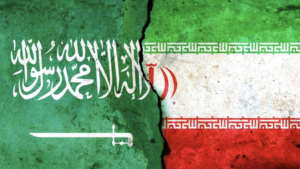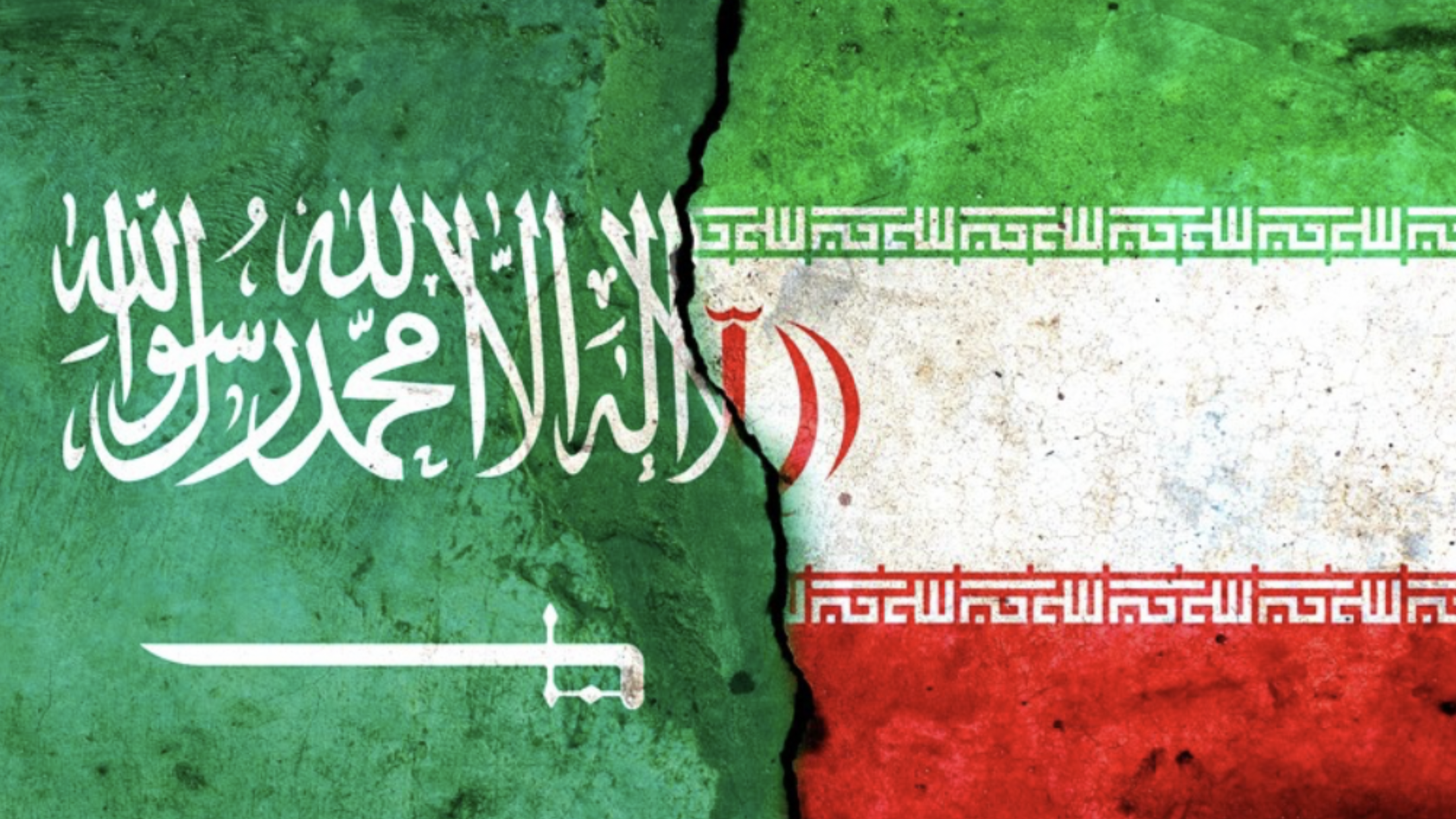𝘿𝙧. 𝙉𝙖𝙗𝙞𝙡 𝘼𝙡𝙞 𝘼𝙡-𝘼𝙩𝙤𝙪𝙢…𝙄𝙧𝙖𝙣𝙞𝙖𝙣 𝙎𝙩𝙪𝙙𝙞𝙚𝙨 𝙐𝙣𝙞𝙩 𝙖𝙩 𝙩𝙝𝙚 𝙂𝙖𝙢𝙚 𝙤𝙛 𝙉𝙖𝙩𝙞𝙤𝙣𝙨 𝘾𝙡𝙪𝙗 𝐒𝐚𝐮𝐝𝐢-𝐈𝐫𝐚𝐧𝐢𝐚𝐧 𝐫𝐞𝐥𝐚𝐭𝐢𝐨𝐧𝐬 𝐟𝐨𝐥𝐥𝐨𝐰𝐢𝐧𝐠 𝐭𝐡𝐞 𝐆𝐚𝐳𝐚 𝐰𝐚𝐫:
 𝘼𝙗𝙨𝙩𝙧𝙖𝙘𝙩: In the Arabian Gulf, the Kingdom of Saudi Arabia and Iran are regarded as the preeminent regional actors on account of their strategic influence and geopolitical positioning. Given their substantial reserves of natural resources and advantageous geographical positioning, these two countries hold immense significance. China facilitated a reconciliation between Iran and Saudi Arabia in March 2023, but since then, they have engaged in severe competition across all domains. Iran’s efforts to increase regional power and influence, along with its substantial involvement in crises such as Syria, Iraq, Yemen, and Lebanon, have played a role in the escalation of animosity between Iran and the Kingdom in the region. According to the research trajectory, the persistent antagonism between the two countries, in conjunction with Iran’s pursuit of expansion, ideological diversion, and geopolitical confrontation, will maintain the recurring pattern of discord in their bilateral relations. The bilateral relations between the Kingdom of Saudi Arabia and Iran came perilously close to a complete breakdown in the aftermath of the Arab Spring. Since the two countries have invested a great deal of interest in increasing their regional influence among their respective audiences in Islamic societies,.
𝘼𝙗𝙨𝙩𝙧𝙖𝙘𝙩: In the Arabian Gulf, the Kingdom of Saudi Arabia and Iran are regarded as the preeminent regional actors on account of their strategic influence and geopolitical positioning. Given their substantial reserves of natural resources and advantageous geographical positioning, these two countries hold immense significance. China facilitated a reconciliation between Iran and Saudi Arabia in March 2023, but since then, they have engaged in severe competition across all domains. Iran’s efforts to increase regional power and influence, along with its substantial involvement in crises such as Syria, Iraq, Yemen, and Lebanon, have played a role in the escalation of animosity between Iran and the Kingdom in the region. According to the research trajectory, the persistent antagonism between the two countries, in conjunction with Iran’s pursuit of expansion, ideological diversion, and geopolitical confrontation, will maintain the recurring pattern of discord in their bilateral relations. The bilateral relations between the Kingdom of Saudi Arabia and Iran came perilously close to a complete breakdown in the aftermath of the Arab Spring. Since the two countries have invested a great deal of interest in increasing their regional influence among their respective audiences in Islamic societies,.
𝐈𝐦𝐩𝐚𝐜𝐭, 𝐠𝐚𝐩𝐬, 𝐚𝐧𝐝 𝐩𝐫𝐨𝐬𝐩𝐞𝐜𝐭𝐬.
Prior to the surprise attack on Israel on October 7, the ongoing conflict in Gaza and its regional repercussions, including the Houthi blockade of the Red Sea, had already further polarized diplomatic relations between the two countries. This was evident in the slow pace of the of the reopening of embassies and the controversy surrounding Iran’s insistence that photographs of Qassem Soleimani, the former commander of the Quds Force of the Iranian Revolutionary Guard, be displayed as a prerequisite.
Is there a chance that the situation could escalate into a full-blown war? Could the Houthi movement in Yemen potentially trigger an armed conflict that would forever hinder the reconciliation between Saudi Arabia and Iran?
The ongoing conflict between Israel and Hamas in Gaza carries significant implications for the Arab Gulf states, the Middle East region, and the global community at large. There is a real possibility that these consequences may have far-reaching effects. It extends its influence beyond the realms of the military and diplomacy to reshape public opinion in the Arab Gulf states.
The Gaza war and the Israeli army’s atrocities against the Gazan people have rekindled public sympathy for the Palestinian cause, despite earlier surveys showing a fallback in such support.
Arab and Islamic nations have been indignant at the United States’ unconditional military support for Israel, despite the fact that over thirty-three thousand Palestinian civilians, of which half were children and women, had been slain. Although Benjamin Netanyahu, the prime minister of Israel, has predicted that the conflict will persist for an extended period of time, Israel will maintain control over the Gaza Strip. The Gaza war’s course may have repercussions on the relationship between Riyadh and Tehran, as it has altered regional customs and tensions.
𝙏𝙝𝙚 𝙥𝙚𝙣𝙙𝙞𝙣𝙜 𝙘𝙤𝙣𝙛𝙡𝙞𝙘𝙩
According to Giorgio Cafiero, an assistant professor at Georgetown University and Persian Gulf region expert, there are two basic narratives about the effects of Israel’s assault in Gaza on Tehran-Riyadh relations. Hamas’ Al-Aqsa flood operation, as well as the behavior of other Iranian-backed entities in the region, such as Hezbollah in Lebanon and militias in Iraq and Yemen, have raised Saudi Arabia’s concerns about Tehran’s behavior and influence in the Middle East. The alternative tale is that the two parties have grown closer since the start of the war and want to work more in the area, particularly on crises and unsolved issues, most notably the Palestinian question. Since the start of Hamas’ October 7 attacks on Israel, Tehran has plainly and openly expressed its support for this campaign against the Israeli occupation. From a military standpoint, Operation Al-Aqsa Flood allowed Tehran and its forces to demonstrate their dominance in a fiercely competitive region. From a strategic standpoint, it aims to rearrange… and organize its position and influence in the region, as the Al-Aqsa Flood operation occurred in the midst of negotiations between Riyadh and Tel Aviv about normalizing relations, and this process was like a cold water chock poured on the body of those negotiations, knowing that Iran and its arms were planning this operation to achieve a number of goals, the most important of which is disruption… these conversations.
Simultaneously, this precipitated the complete unraveling of the strategic thread that the United States had laboriously woven for years, transforming it into mere cotton. Under the current conditions, it seems impossible to find a way out of this crisis in the Middle East, which is precisely what Washington hopes to justify through its continued presence and the region’s necessity for it.
Additionally, Israel asserts that it will never cede to the two-state solution plan supported by the United States. In contrast, Saudi Arabia maintains a stance opposing negotiations with Israel until the latter acknowledges the existence of a Palestinian state. This stance is motivated by Saudi Arabia’s concern for the well-being of the Islamic and Arab populations, as well as its status as the epicenter of the Islamic nation. Maintaining an impartial position is essential for safeguarding the security and stability of the kingdom in the region, as it symbolizes the astute arbiter of potential future successful resolutions to the ongoing conflict.
𝙂𝙖𝙥𝙨 𝙞𝙣 𝙘𝙤𝙣𝙫𝙚𝙧𝙜𝙚𝙣𝙘𝙚
There appears to be an increasing convergence of interests and collaboration between Iran and Saudi Arabia. During the initial stages of the Gaza war, a limited degree of correspondence and meetings between the two nations inspired considerable optimism regarding the potential for joint efforts to halt the heinous Israeli assaults on Gaza. However, as time passed, Saudi Arabia opted for an alternative strategy involving coordination with the United States and its Arab allies. This strategy has thus far averted a regional conflict by bolstering the axis of resistance and thwarting Tehran’s efforts to exert influence; however, the precise reaction of Tehran to Riyadh’s actions remains uncertain.
Saudi Arabia is concerned about the potential economic repercussions of the Gaza conflict on Vision 2030, the initiative of Crown Prince Mohammed bin Salman. The primary focus of Riyadh is the ambitious undertakings it has conceptualized and plans to execute in the Red Sea. Consequently, despite the conflict’s limited magnitude, its significance is evident. It is ongoing, however, and may have repercussions for a number of economic initiatives and tourist destinations in the Kingdom of Saudi Arabia. Hence, the security of the Red Sea emerges as a significant obstacle in the diplomatic ties between Tehran and Riyadh, given the substantial influence that the Yemeni Houthi, an ally of Tehran, has amassed along that waterway.
It is evident that Tehran is employing bilateral diplomacy with both the militias and Riyadh as a strategic maneuver to counterbalance or challenge Saudi Arabia’s influence subsequent to the diplomatic relations’ resumption in March 2023.
The Gaza crisis further highlights the conceptual disparity that exists between the United States’ anticipations regarding the Abrahamic Agreement and the normalization process and the Gulf Cooperation Council countries’ expectations. Bahrain, a member of the Gulf Cooperation Council and one of the first signatories to the peace agreement with Israel, has withdrawn its ambassador from Israel; others may follow suit.
The United States argues that the Gulf Cooperation Council countries joined the agreement as a means of safeguarding themselves against Iran. However, Arab nations have been striving to establish more amicable relations with Israel and alleviate tensions with Iran, given its interventionist policies and refusal to endorse the two-state solution. Saudi Arabia has skillfully navigated diplomatic relationships with various parties, including Tehran, in its efforts to promote stability in the region. The kingdom has also made strides in normalizing relations with Tel Aviv and maintaining strong ties with both Eastern and Western powers. Nevertheless, the ongoing rivalry between Saudi Arabia and Iran continues to run deep, with the Gaza conflict only exacerbating the situation. It is essential to grasp the significance of Israel’s pursuit of formal relations with Arab countries, particularly Saudi Arabia, in order to bolster the military alliance against Iran.
However, Iran may face countervailing pressures if it maintains cordial relations with Egypt and Saudi Arabia. This is because Iran will be cautious in managing its “axis of resistance,” fearing that doing so could jeopardize the progress it has made in mending relations with these two Arab countries and that there will be no genuine opportunities to improve relations with the United States and Western powers. Better relations with Riyadh and Cairo provide Iran with some solace in light of the pressure strategy employed by the West against it.
𝙊𝙥𝙥𝙤𝙧𝙩𝙪𝙣𝙞𝙩𝙞𝙚𝙨 𝙛𝙤𝙧 𝙘𝙤𝙣𝙫𝙚𝙧𝙜𝙚𝙣𝙘𝙚
Iran and Saudi Arabia both share a common goal of achieving a ceasefire in Gaza. However, their visions for the post-war period in Gaza diverge, particularly when it comes to the governance system that has been under siege for years.
The economic situation of both countries plays a crucial role in reaching an agreement on a ceasefire. Amidst the sanctions imposed on Iran, officials in Tehran are keeping a watchful eye on the potential ripple effects of the Gaza war on the broader Middle East. The Iranian economy is at stake, and the Kingdom of Saudi Arabia is not without its own set of worries… The crisis in Palestine could potentially jeopardize Crown Prince Mohammed bin Salman’s ambitious 2030 vision.
Yet another reason for the rapprochement is the emerging Islamic solidarity that is fostering a closer relationship between Saudi Arabia and Iran. Both governments are calling for an immediate ceasefire, denouncing the immense destruction caused by the Israeli war in Gaza, and expressing their unwavering commitment to peace and stability in the Arabian Gulf.
There are two narratives in this context that can be observed, and surprisingly, they don’t contradict each other. While Saudi Arabia and Iran both have concerns about the Gaza crisis, Riyadh is also wary of Tehran’s potential to exploit the conflict in ways that could negatively impact the Kingdom of Saudi Arabia and its Arab neighbors.
It is worth noting that the Saudi leadership holds the belief that Iran and Israel are involved in the ongoing unrest in the region. They also hold the view that Iran and Israel are the only parties opposing the two-state solution. Riyadh, however, is well aware of the potential consequences of Israel’s forceful response on October 7, which Iran may seek to exploit. Saudi Arabia remains concerned about Iran’s opportunistic behavior and its negative impact on regional stability. Addressing this concern is of utmost importance to Saudi Arabia’s security.
Simultaneously, Saudi Arabia acknowledges the Israeli occupation and indiscriminate bombing of Gaza as contributing to regional instability. While Saudi Arabia may have concerns and even resentment towards Iranian opportunism, it is expected that the tension between the two parties will remain within the boundaries of diplomacy and negotiations during this critical period.
Saudi Arabia and Iran, as two prominent Muslim-majority nations vying for influential positions in the Muslim world, have expressed deep concern over the devastating consequences of the Israeli war on Gaza.
On October 11, Iranian President Ibrahim Raisi and Saudi Crown Prince Mohammed bin Salman had their first telephone conversation since the reconciliation agreement was signed in China approximately a year ago. Furthermore, Raisi participated in the joint emergency meeting of the League of Arab States and the Organization of Islamic Cooperation. Concerning Gaza, the meeting took place in Riyadh on November 11, marking the first visit of an Iranian president to Saudi Arabia since former Iranian President Mahmoud Ahmadinejad attended the Organization of Islamic Cooperation meeting in August 2012.
In the current situation, Iran is making efforts to avoid causing any disruptions to Saudi Arabia. It is adjusting its rhetoric and gestures towards Saudi Arabia in order to preserve a peaceful atmosphere in their relations, with the help of China as a mediator.
Since October 7, Saudi Arabia has been a focal point of Iran’s diplomatic efforts. Throughout this time, the Iranian Foreign Minister has engaged in consistent discussions with various Arab counterparts, including the Foreign Minister of Saudi Arabia. The objective has been to pursue three specific goals:
One priority is to enhance peaceful relations between Iran and Saudi Arabia.
The second approach involves convincing Riyadh to reconsider any plans for establishing normalized relations with Israel.
Third: This is an opportunity to showcase Iran’s significance as a dynamic regional participant with the ability to shape regional events.
Nevertheless, it is notable that Iran’s achievements in this area may be somewhat limited. According to certain reports, Saudi Arabia appears to be merely postponing, rather than completely abandoning, its intentions to establish diplomatic ties with Tel Aviv, particularly in light of the ongoing Israeli conflict in Gaza.
Iran’s attempts to establish an Islamic regional order centered around Iranian-Arab unity against the United States and Israel did not yield the intended outcomes for Tehran. Nevertheless, it is evident that the Gaza incident resulted in heightened engagement between Iranian and Saudi diplomats. This led to significant meetings involving top officials from both nations. Over time, this diplomatic exchange between Tehran and Riyadh has the potential to foster a deeper comprehension of each other’s perspectives, provided Iran’s intentions are genuine and not deceitful.
𝘼𝙣𝙖𝙡𝙮𝙨𝙞𝙨 𝙖𝙣𝙙 𝙘𝙤𝙣𝙘𝙡𝙪𝙨𝙞𝙤𝙣𝙨
There’s no sign that the Gaza war has negatively impacted Saudi-Iranian relations. In order to manage bilateral relations, China brokered reconciliation between the two parties last year. Establishing a limit for the dispute to prevent it from spiraling out of control was one of its main objectives. The other objective is to shift the relationship’s paradigm from one of conflict to one of cooperation.
Thus far, the Gaza conflict has amply illustrated the strategic importance of Saudi Arabia’s and Iran’s reconciliation. The two nations have been assured by the restoration of diplomatic ties and ministerial and leadership gatherings that they are not at odds with one another in this conflict and that neither will be used as a cover for an attack on the other. From the Saudi perspective, the Kingdom affirms that it does not belong to any coalition that opposes Iran.
The Saudis view Iran’s fervent rhetorical support for the Palestinian cause as opportunistic, and they think that Iran is using the Arab world’s feelings about the Gaza war to gain legitimacy both locally and regionally for its interventions and influence.
The war in Gaza is unlikely to end the relationship between Saudi Arabia and Iran due to their agreement on the Palestinian issue and Saudis’ understanding of Israel’s occupation of Palestinian territories. Tensions may arise due to tensions, but they are unlikely to escalate. Both parties have reasons to continue the reconciliation process, such as Iran adhering to its agreement regarding the annual Hajj and Saudi Arabia’s desire to avoid conflict with the Houthis on Yemen’s borders. The Saudi ruling elites have found ways to manage controversial relations, and they are expected to do the same with Israel if the war in Gaza ends.
With Crown Prince Mohammed bin Salman at the helm, Saudi Arabia is shifting its attention towards domestic advancements and ambitious undertakings. This strategic reevaluation places a greater emphasis on national progress than external disputes. Iran, amidst potential conflicts surrounding its nuclear program and international pressures, is also striving to secure its regional position and brace itself for a potential conflict with the United States and Israel, particularly with the upcoming US presidential elections on the horizon.
The current lull has certainly caused a stir in regional power dynamics, catching the United States off guard and throwing a wrench into Israel’s strategic calculations. It’s a clear sign of the ongoing trend in which traditional power dynamics are being reevaluated and new connections are being explored.
𝘿𝙧. 𝙉𝙖𝙗𝙞𝙡 𝘼𝙡𝙞 𝘼𝙡–𝘼𝙩𝙤𝙪𝙢


